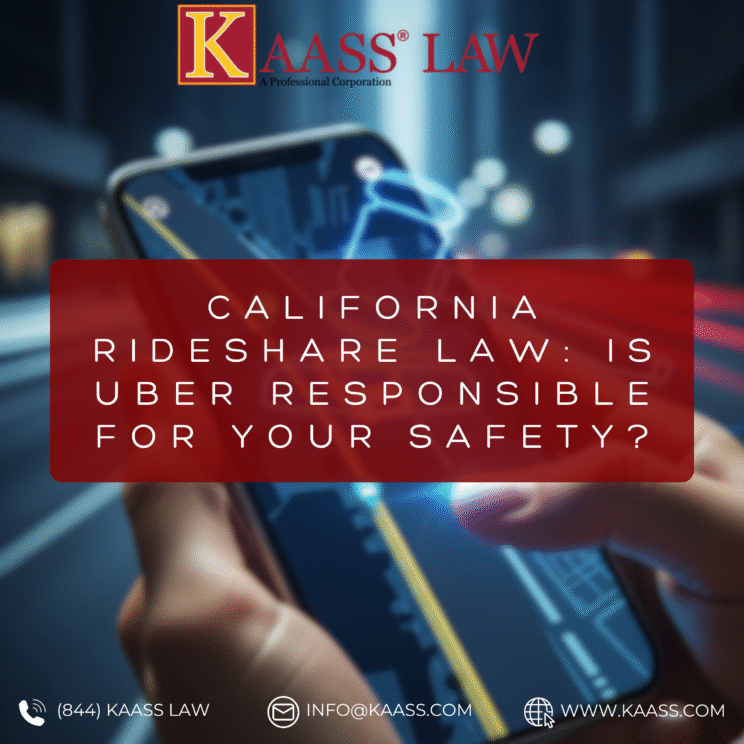Rideshare services like Uber and Lyft are a part of daily life for millions of Californians. We use them constantly, trusting them to be a safe way to get around. However, when an accident or an assault happens during a ride, passengers often wonder who is responsible. While the driver is one party, what about the billion-dollar company that sent them? Understanding California Rideshare Law is essential for knowing your rights in these situations.
Recent legal discussions, based on materials from legal presentations, highlight that Transportation Network Companies (TNCs) have significant safety duties. This article will break down the specific safety rules TNCs must follow. We will also explore the important legal concept of a “common carrier” and how it applies to your ride.
California Rideshare Law: Key TNC Safety Rules
According to the California Public Utilities Commission (CPUC), the agency that regulates rideshare companies, TNCs must meet several crucial safety requirements to operate in the state. These regulations mean TNCs have a duty to ensure their drivers are safe before they ever pick up a passenger.
These non-negotiable safety requirements include:
- Criminal Background Checks: TNCs must perform a criminal background check on every driver before they begin offering service.
- Zero-Tolerance Policy: Companies must have a zero-tolerance policy for intoxicating substances.
- Driving Record Checks: TNCs must obtain each driver’s driving record before they start. They must also review it quarterly thereafter. Critically, drivers with convictions for serious offenses like reckless driving, hit-and-run, or driving under the influence cannot drive for TNCs.
- Driver Training Program: The company must establish a driver training program. This ensures all drivers operate their vehicles safely before they can offer service.
- Licensing and Age: TNC drivers must have a valid California driver’s license, be at least 21 years old, and have at least one year of U.S. driving history.
The Common Carrier Rule in California Rideshare Law
A central question in California Rideshare Law is whether TNCs qualify as “common carriers.” This legal term has a very specific and important meaning.
What is the “Common Carrier” Standard?
A common carrier is defined as anyone who offers to carry persons or property for the public. Historically, this applied to taxis, buses, and trains. The law holds these carriers to a much higher legal duty than a typical person. According to the official text of California Civil Code § 2100, a carrier of persons for reward must use the “utmost care and diligence” for their safe carriage.
This “utmost care” is a stricter standard than the “reasonable care” required of ordinary drivers. In practice, it means the company must do everything reasonably possible to ensure passenger safety. If a court considers a TNC like Uber or Lyft a common carrier, the company has a heightened responsibility to protect you from harm. This can be a powerful tool in a Personal Injury case.
Violating California Rideshare Law: Company Liability
If a TNC fails to follow the mandated safety rules and that failure leads to a passenger getting hurt, the company itself may be held negligent. This creates liability separate from the driver’s actions at the moment of the crash. For example:
- If a TNC failed to conduct a proper background check and a driver with a violent history assaults a passenger, the company could be liable for negligent hiring.
- If a TNC did not properly check a driver’s record and a driver with multiple past DUIs causes an accident while impaired, the TNC could be at fault for putting a dangerous driver on the road.
- If an accident occurs and an investigation finds the driver never completed the required safety training program, the TNC may share in the liability for the resulting harm.
These scenarios focus on the company’s failure to uphold its own safety obligations under the law.
Steps to Take if Injured in an Uber or Lyft
If you are injured while you are a passenger in a rideshare vehicle, taking immediate steps can protect your health and your legal rights.
- Call 911: First, report the accident to the police. You should also request medical assistance immediately.
- Document Everything: Get the driver’s name and contact information. Be sure to take screenshots of the ride information in your app, including the license plate, driver, and trip details.
- Get Witness Information: If other passengers or witnesses are present, politely get their contact details.
- Report to the TNC: Use the app to formally report the accident and any injuries to Uber or Lyft’s customer service.
- Consult an Attorney: Before you give any detailed recorded statements to an insurance adjuster—whether for the driver or the TNC—contact a lawyer who understands California Rideshare Law.
How KAASS LAW Can Help
Navigating a claim against a massive TNC like Uber or Lyft can be very intimidating. Their insurance policies are complex, and they have powerful legal teams. At KAASS LAW, our attorneys understand the specific rules and regulations that govern rideshare companies in California. We have experience handling complex Personal Injury cases that involve multiple liable parties.
Our team investigates to see if a TNC failed in its duty to ensure driver safety. We fight to hold these large corporations accountable when their negligence contributes to passenger injuries. If a rideshare accident injured you, please Contact Us for a free, confidential consultation.
Conclusion
While rideshare apps offer amazing convenience, the companies behind them have a significant legal responsibility to keep their passengers safe. California Rideshare Law requires TNCs to vet their drivers and follow strict safety protocols. Furthermore, the argument that they must be held to the high “common carrier” standard of care is a powerful one for protecting victims. If a rideshare accident injures you, remember that the liability may extend beyond just the driver. It can reach the corporation that hired them and put them on the road.

